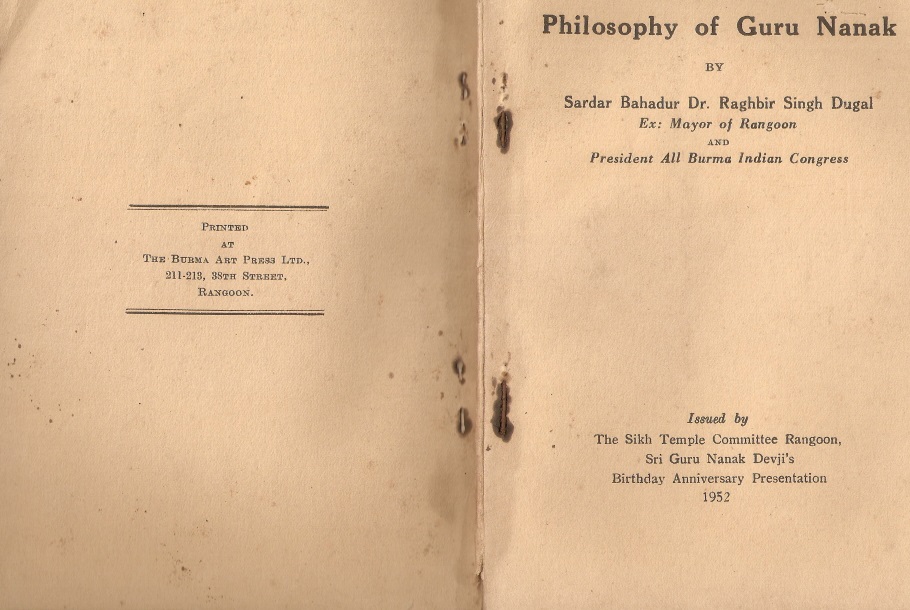“Philosophy of Guru Nanak, 1952”
A talk by Sardar Bahadur Raghbir Singh Dugal on 28th July 1950 at the Ramakrishna Mission Society, Cultural Studies Group, Rangoon.

PREFACE
Two years back was published my small book “Essentials of Sikhism”. In it was given a short account of the background and growth of Sikhism as a religious movement. It was intended primarily for non-Sikh readers to understand Guru Nanak and his religion.
The reception it received from all quarters has shown beyond all doubt the existence of a desire for further information on and knowledge of Sikhism in all sections of society. This fact has provided a stimulus and encouragement for the present undertaking – “The Philosophy of Guru Nanak”. I must, however, confess that for the constant encouragement from Swami Akunthanandaji of the Ramakrishna Mission Society, who was contemplating to hold under the auspices of the Mission, a Parliament of Religions and wanted someone to prepare a paper on Sikhism, this publication would not have seen the light of the day.
In trying to understand Guru Nanak and his religion the fact will have to be borne in mind that Northern India, where he was born, has been honeycombed with conflicting ideologies and sects. A spiritual confusion prevailed everywhere. There was deep religious darkness. It was at this critical juncture that Guru Nanak Dev gave his lecture of Divinity of Soul and Oneness of Existence. The sole theme of his saying (hymns) which are incorporated in the Guru Granth Sahib is this message. These hymns also provide material for his philosophy.
No originality is claimed for what is stated in this book. Numerous valuable works, by learned Sikhs and others, both in English and Gurumukhi (the language of the Sikhs [Punjabi]) exist. All of them derive their authority from the Guru Granth Sahib (the scripture of the Sikhs). The philosophy of Guru Nanak is not presented in the Granth Sahib is any systematized manner, nor can a non-Sikh unacquainted with its language and have recourse to it for knowledge and information. The need for authoritative literature on Sikhism in languages other than our mother tongue is obvious. “Philosophy of Guru Nanak” is, therefore, an attempt towards that direction. Moreover, like other religions, Sikhism is little known beyond the borders of India. If, therefore, this publication succeeds in giving the reader a bid’s eye view of the fundamentals of the Master the author would be amply rewarded.
In conclusion, I am indebted to all the authorities and authors on whose works I have drawn. In this connection, I am indebted in particular to Dr. Sher Singh Giyani on whose valuable works I have literally drawn. I am also especially thankful to Swami Hiranmayanandaji of Ramakrishna Sevshram Hospital, Rangoon for having gone through the manuscript, making very valuable suggestions for its improvement and writing the foreword. Many thanks are also due to Swami Akunthanandaji for going through the book prior to its publication, to Mr. P.V. Subbiah, Office Superintendent of the All Burma Indian Congress, for tying the manuscript during his off-hours and to Mr. T. Jayaram for the help you gave me in reading the proofs.
R. S. Dugal
243 Sparks Street, Rangoon, Burma
1952